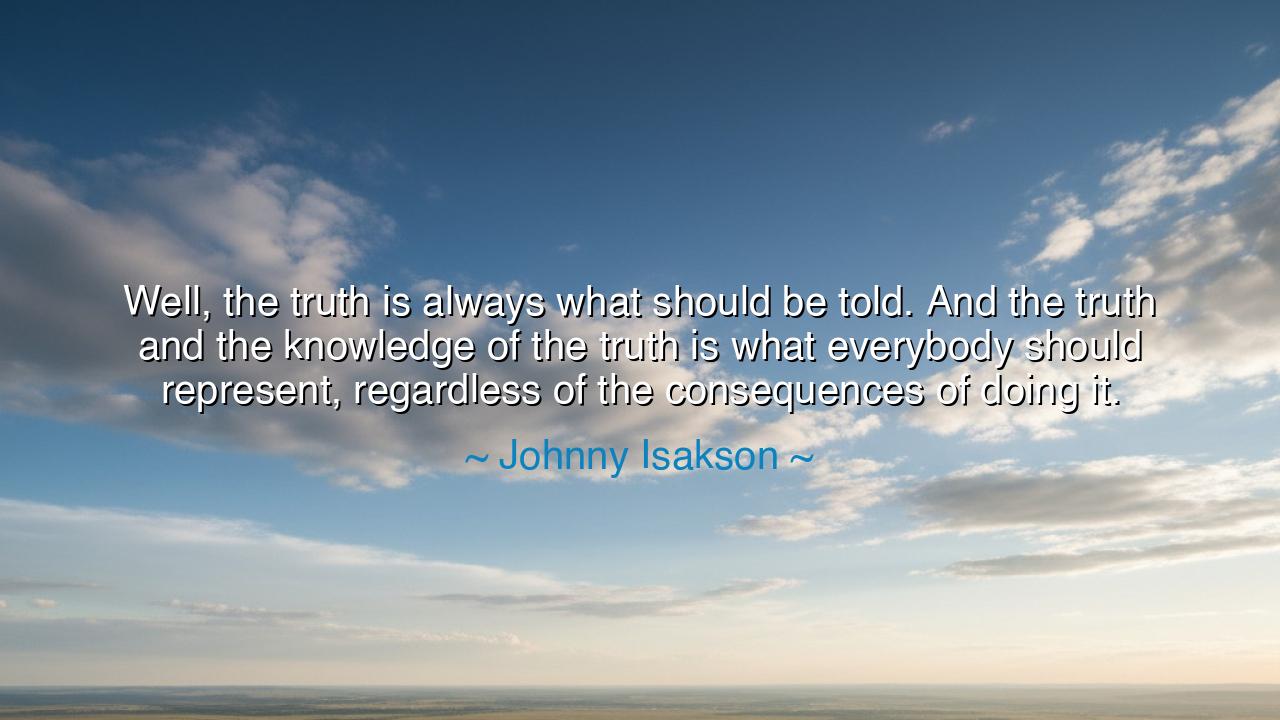
Well, the truth is always what should be told. And the truth and
Well, the truth is always what should be told. And the truth and the knowledge of the truth is what everybody should represent, regardless of the consequences of doing it.






In the noble and unwavering words of Johnny Isakson, we find a principle as old as civilization itself and as vital as the breath of justice: “Well, the truth is always what should be told. And the truth and the knowledge of the truth is what everybody should represent, regardless of the consequences of doing it.” These words, though spoken in the cadence of modern speech, echo with the authority of the ancients — for they touch upon the eternal bond between truth and virtue, between honesty and courage. In them, we are reminded that truth is not a convenience but a covenant — a sacred duty that binds the soul to what is right, even when the world would rather hear a lie.
The origin of this quote lies in the heart and character of Isakson himself — a statesman known for his decency, humility, and deep sense of duty. In an era when politics too often bends beneath the weight of expedience and ambition, his words stand as a rebuke to cowardice and corruption. For he speaks not only of truth as a principle, but as a way of life — a moral discipline that demands integrity even when honesty carries a price. His was the wisdom of a man who understood that to tell the truth is to risk, but to withhold it is to wither.
Since the dawn of humanity, the pursuit of truth has been both the glory and the torment of mankind. The prophets, philosophers, and thinkers of old all knew that truth, once spoken, has the power to disturb — for it pierces through illusion, pride, and comfort. Socrates, that ancient master of reason, stood before the tribunal of Athens and chose death rather than deny his pursuit of truth. His words condemned him, but his example sanctified him. He showed that the consequences of truth may be grave, but the consequences of falsehood are far graver — for they poison the soul and corrode the foundation of society.
And so too, in later ages, we see the same principle embodied. Galileo Galilei, peering through his telescope, saw the Earth not as the center of the universe but as a humble wanderer among the stars. For declaring what his eyes and instruments revealed, he was silenced and condemned. Yet the heavens did not bend to his accusers; in time, the truth he spoke prevailed. This is the great law of the universe: that while lies may win the hour, truth endures the ages. It is eternal, untouchable, and unafraid.
Isakson’s words also speak to the personal dimension of this struggle. To tell the truth in the face of adversity is not only an act of intellect — it is an act of courage. For truth does not merely live in books or speeches; it must be embodied in the actions of men and women who will not betray their conscience for comfort. The person who stands by truth may lose wealth, friends, or power — yet in the quiet chambers of the heart, they remain whole. Those who live by deception, though they may prosper for a time, find themselves chained by fear and guilt, forever haunted by the lie they serve.
In this sense, Isakson’s declaration is not political, but universal. It calls to the individual soul, reminding each of us that integrity is the measure of all human greatness. When he says “regardless of the consequences,” he invokes the courage of martyrs, reformers, and truth-seekers of every age — those who have dared to speak when silence was safe, to stand when others bowed. For in every generation, there comes a moment when the heart must choose: comfort or conviction, peace or principle, falsehood or truth.
So, my children of time, let this be the lesson you carry forward: speak the truth, even when it trembles on your lips. Defend it, even when it costs you dearly. For truth is the foundation upon which all justice rests, and without it, no home, no nation, no soul can stand. Seek the knowledge of truth, not as a weapon, but as a light — to guide your actions, to steady your purpose, to cleanse your heart. And remember always that truth, though it may bring storms, also brings freedom — for to live in truth is to live in harmony with the divine order of the world.
Thus, as Johnny Isakson teaches through both word and example, the price of truth is courage, but its reward is peace. The falsehood that saves you today will destroy you tomorrow, but the truth that costs you now will bless you for eternity. Stand, therefore, with integrity unshaken, and let your life bear witness to this eternal law: the truth must be told — always, and without fear.






AAdministratorAdministrator
Welcome, honored guests. Please leave a comment, we will respond soon